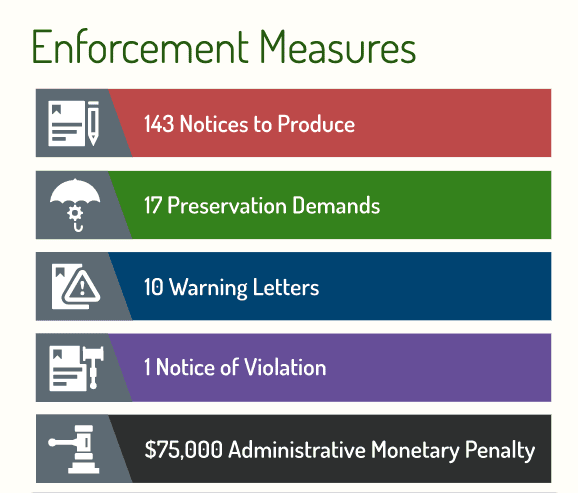The CRTC announced their CASL Enforcement Update for the period of October 2, 2020 to March 31, 2021. While only one fine was handed out ($75,000 to Scott William Brewer), they did issue 143 Notices to Produce, 17 Preservation Demands and 10 Warning Letters:

One of the early fines has been vigorously defended by CompuFinder – right up to the Supreme Court of Canada, who in March 2021 refused to hear an appeal of their earlier decision to uphold CASL as Constitutional. This fine took 5 1/2 years and most likely significant legal fees to wind its way through the Canadian courts. At every stage, CASL was upheld. CompuFinder likely more than doubled their monetary penalty by spending more on lawyers than the reduced AMP agreed to by the CRTC Commission.
“Since CASL came into force in 2014, enforcement efforts have resulted in more than $1.4 million payable. Of this amount, approximately $805,000 is from administrative monetary penalties Footnote1 and $668,000 from negotiated undertakings.”
During this period there were an average of 5560 spam complaints per week submitted by Canadians to the CRTC Spam Centre. Complaints are the beginning of all enforcement activity under CASL.
It is interesting to note the true cost of violating CASL starts with the issuing of a Notice to Produce. Many man hours are required to properly respond to the CRTC and go through the investigation process. In several cases, Companies who have been fined have quietly admittedly that the AMP issued by the CRTC was small compared to the cost of the entire investigation. Clearly, compliant electronic messaging practices (email and SMS text) will keep your company out of the CRTC Spam Centre and off the CRTC radar, not to mention the help it provides to your brand reputation.
In the 7th year of enforcement, CASL has raised the public awareness of spam and the fact than you can actually do something about it. Brands who continue to email Canadians without proof of consent (express or implied) do so with 3 significant risks:
- Erosion of brand trust
- A CRTC investigation
- An AMP (for a violation or an undertaking)
Notice the phrase “proof of consent”. Many companies think it is good enough to just have consent. But in the eyes of the CRTC, if you cannot prove specific individual consent, it does not exist. In our experience there are many companies who operate thinking they can prove consent for every individual they email, but when push comes to shove, they are unable to provide the actual proof. Setting up small processes to track and record consent is a cornerstone of a CASL compliant programme and can bring a CRTC investigation to an abrupt end.
For more information, reach out to info@responsema.org and we will have our experts answer any questions or concern about your current operative practices and your CASL compliance programme.



